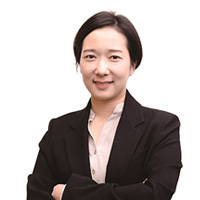Arario Gallery reopens after a year, finding space next to Arario Museum
By Park YunaPublished : Feb. 1, 2023 - 10:25

Arario Gallery, a leading commercial gallery in South Korea, has reopened the space after a year of hiatus, finishing its relocation to a new place in central Seoul.
Looking over Changgyeonggung, the gallery is now located next to Arario Museum.
Founded in 1989, the gallery is one of oldest galleries that have supported Korean artists for decades. Reopening on Feb. 1, the gallery has moved to Wondseo-dong in Jongno-gu, central Seoul, next to the landmark building of Gonggan Saok, a former architecture office designed by late Kim Swoo-geun, Korea’s pioneering modern architect, which is now home to the Arario Museum.

The building located next to the museum was newly acquired by the gallery, and Japanese architect Jo Nagasaka took charge of the renovation of the six-story building. Arario Group Chairman Kim Chang-il bought the Gonggan Saok in 2013 for 15 billion won ($12 million) to use for the museum.
The gallery has kicked off the exhibition “Romantic Irony” in commemoration of the gallery's reopening, inviting five Korean artists whom the gallery has worked with in the past -- sculptor Gwon O-sang, sculptor Lee Dong-wook, installation artist Kim In-bai, painter Ahn Ji-san and painter Noh Sang-ho whose works are on display throughout the new gallery space.
Ahn’s paintings in the basement induce tension from visitors, taking on the theme of snowstorm and haunting. The painter invites audiences to both fear and hear from nature, with a canvas reminiscent of German Romanticist painter Caspar David Friedrich’s landscapes.

Lee emphasizes the fragility of humans, reflecting human nature for his eight new pieces -- each about 15 centimeters tall and created with aluminum honeycomb panels.
Noh has unveiled the new painting series “Holy,” hovering between the virtual and actual, using AI-powered digital imaging technique. The artist does not simply rely on the AI technique; he takes the images created by the digital technique and reinterprets them in his way – painting the images using airbrushes.
Gwon’s seven newly unveiled pieces at the gallery are based on the artist's agony over sculpture itself -- What is the future of sculpture? Exploring “photographic sculptures,” Gwon’s new works pay homage to British sculptor Henry Moore.

Installation artist Kim talks about the concept of connection through his art. The artist created four sculptures for the exhibition -- “Fog,” “Mirror,” “Metamorphosis” and “Chalk.” His works revolve around the concept of blind spots in our lives.
The gallery operates in three places including its Seoul and Cheonan venues in Korea and one in Shanghai, China. The venue in China also reopened at West Bund, Shanghai in October 2022.

By Park Yuna (yunapark@heraldcorp.com)


















